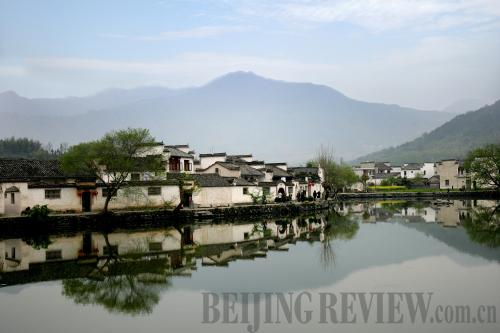|
 |
|
VILLAGE IN VIEW: Hongcun Ancient Village in Anhui Province is a perfect combination of architecture and natural landscape in line with ancient Chinese fengshui principles (CFP) |
"Never situate a toilet door in line with the entrance to a home, otherwise bad luck might hit the owners," said Wang Min, while remonstrating a builder on the taboos of housing design.
Throughout the summer, Wang has been occupied with decorating her new Tianjin apartment, which she bought with her husband last year.
Like many young couples, they have spent much time and energy making their first home comfortable, though in strict accordance with the principles of fengshui, an ancient Chinese geomantic theory based on creating favorable conditions for life and death as well as inviting good fortune. Wang believes that following traditions such as not placing a mirror opposite a bed, amongst others, will bring her household good luck.
Generally speaking, fengshui involves choosing a geographically favorable environment to build a residence or tomb. Literally, feng and shui means wind (or air) and water in Chinese, respectively.
It makes sense
For more than 1,000 years, the Chinese followed particular forms of fengshui, based on human harmony with nature, a balance of yin and yang as well as promotion and restraint between the five elements (wood, fire, earth, metal and water).
Today, the influence of fengshui remains strong in China, especially against the backdrop of booming urbanization and construction.
In Beijing, apart from offering modern design services, many companies also advise on fengshui. Yu Yong, a salesperson with a local firm, told Beijing Review, "Some customers do care about fengshui when it comes to their new homes. In particular, business people believe an interior design following fengshui principles could bring them good fortune."
Whether there really exists a connection between fortune and home design remains a topic of much debate. However, the influence of fengshui is beyond question, judging by the numerous ancient sites across China.
Hongcun Ancient Village is located at the foot of Huangshan Mountain in central China's Anhui Province. It was first built during the Southern Song Dynasty (1127-1279) and rebuilt in the Ming (1368-1644) and Qing (1644-1911) dynasties.
| 